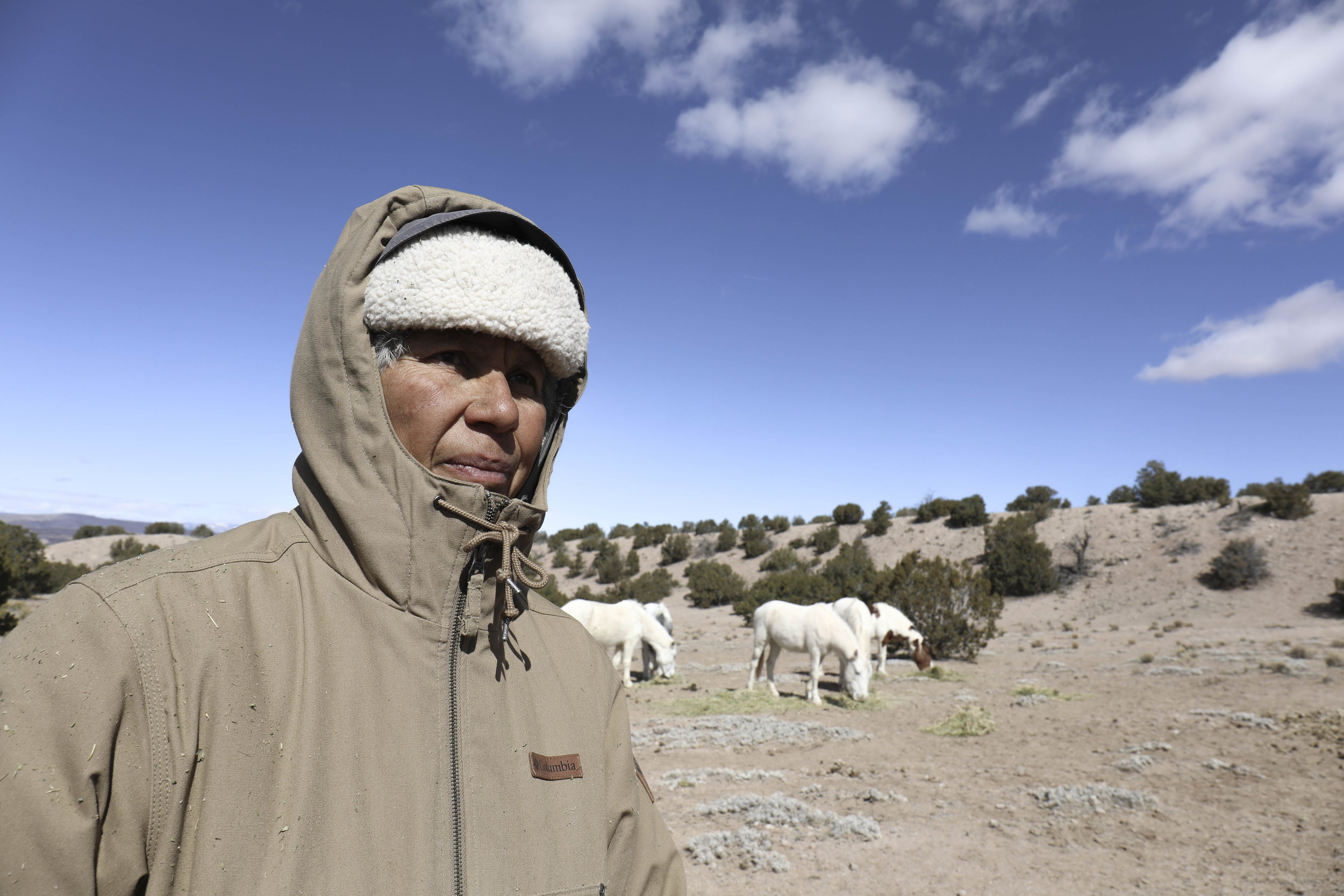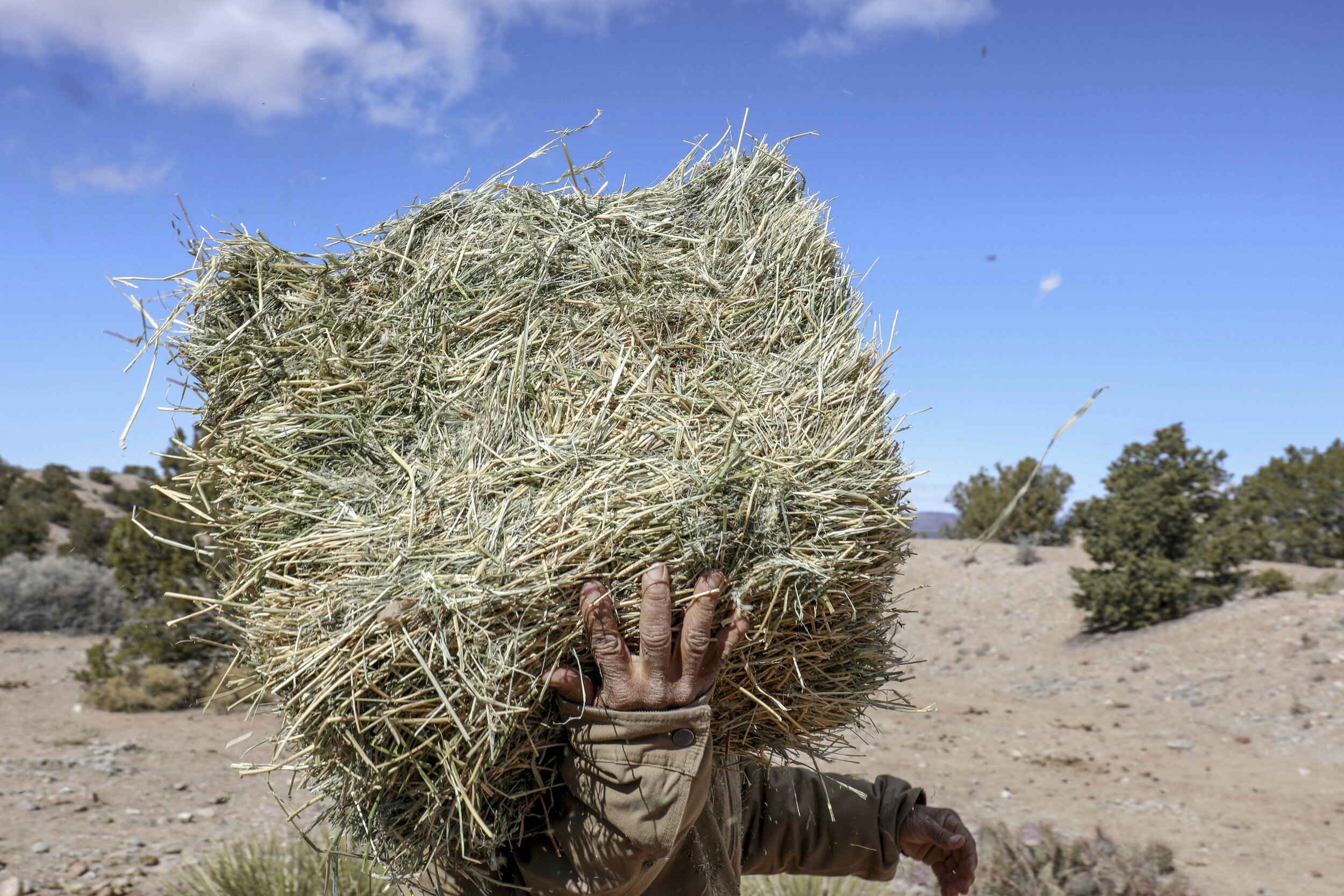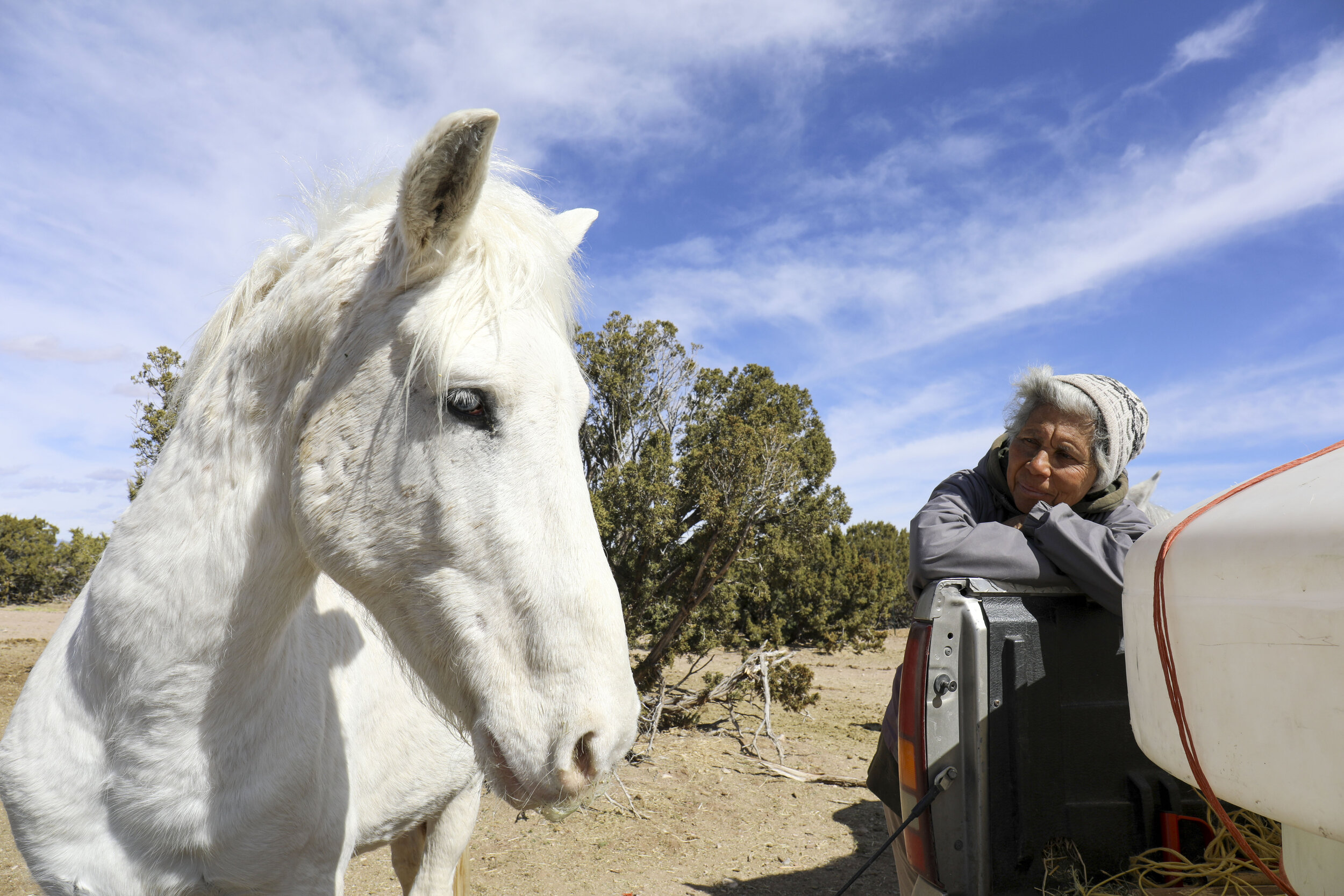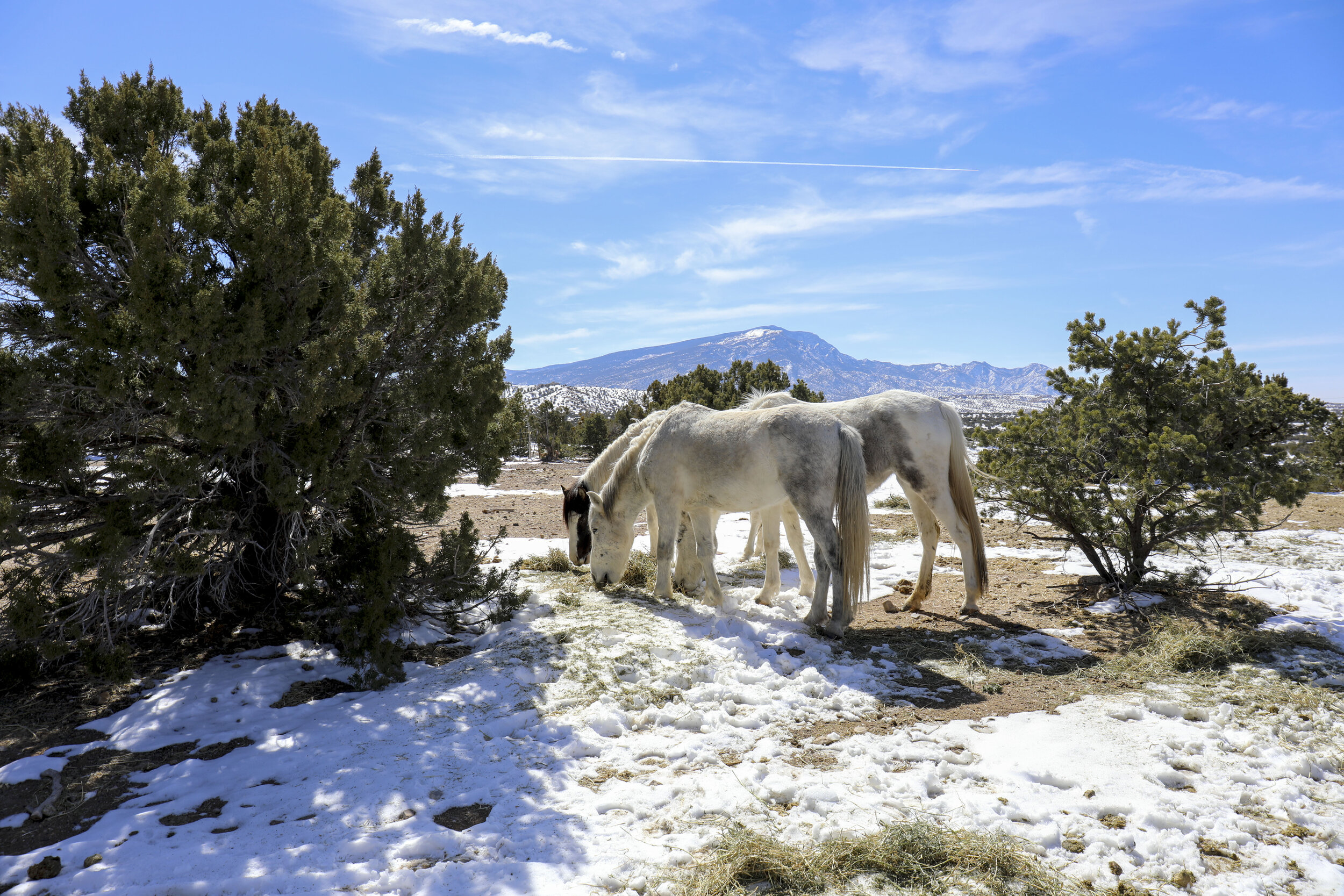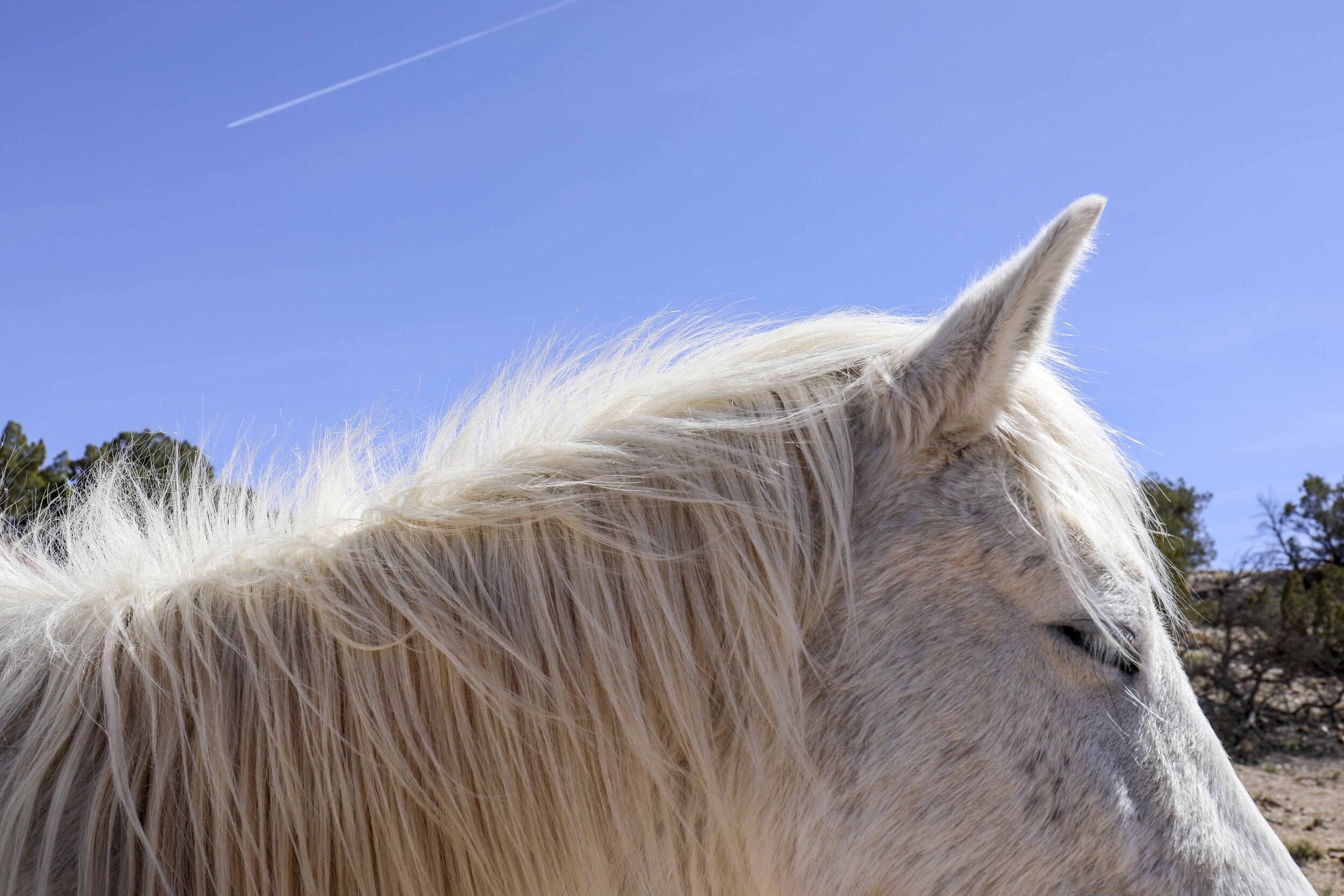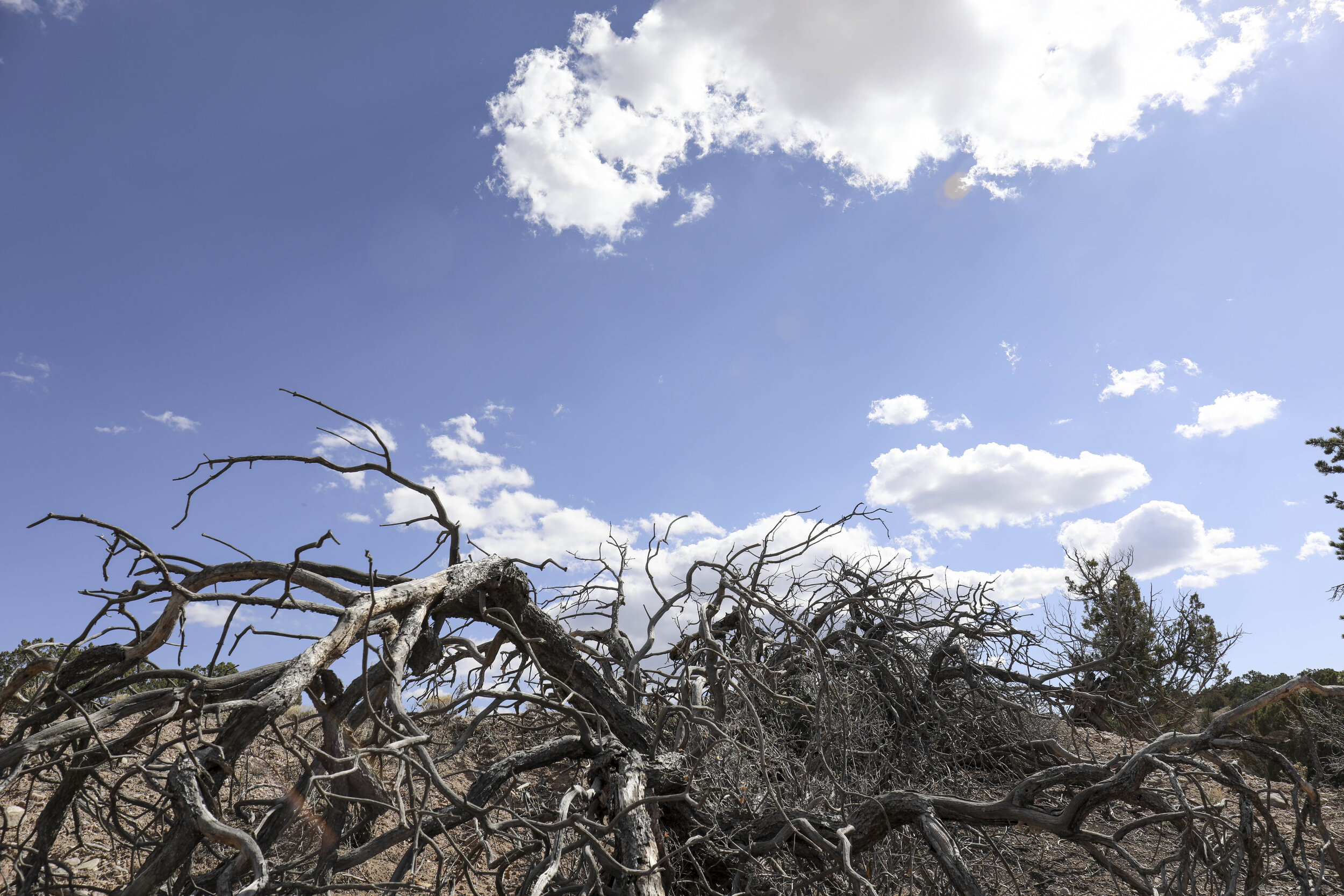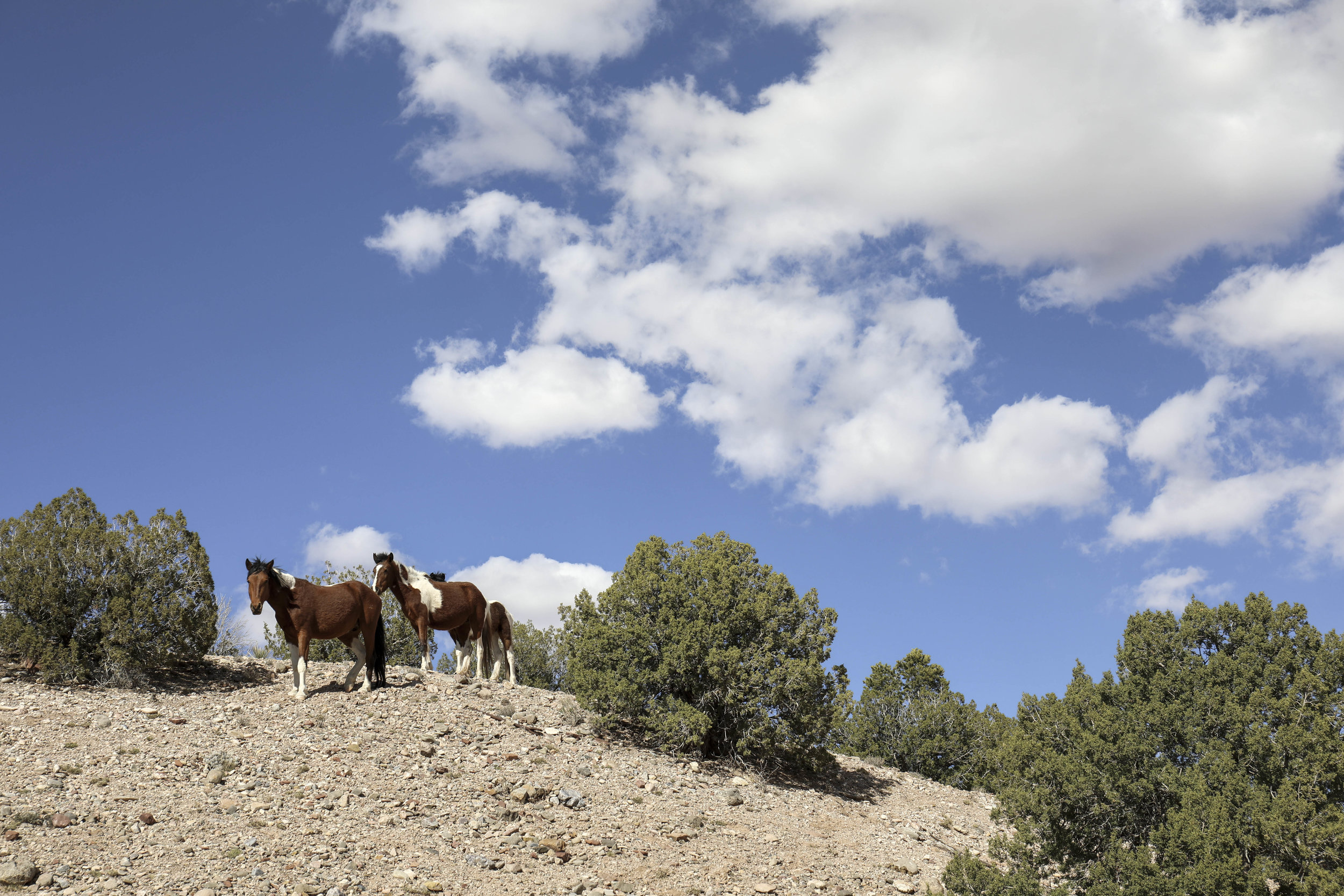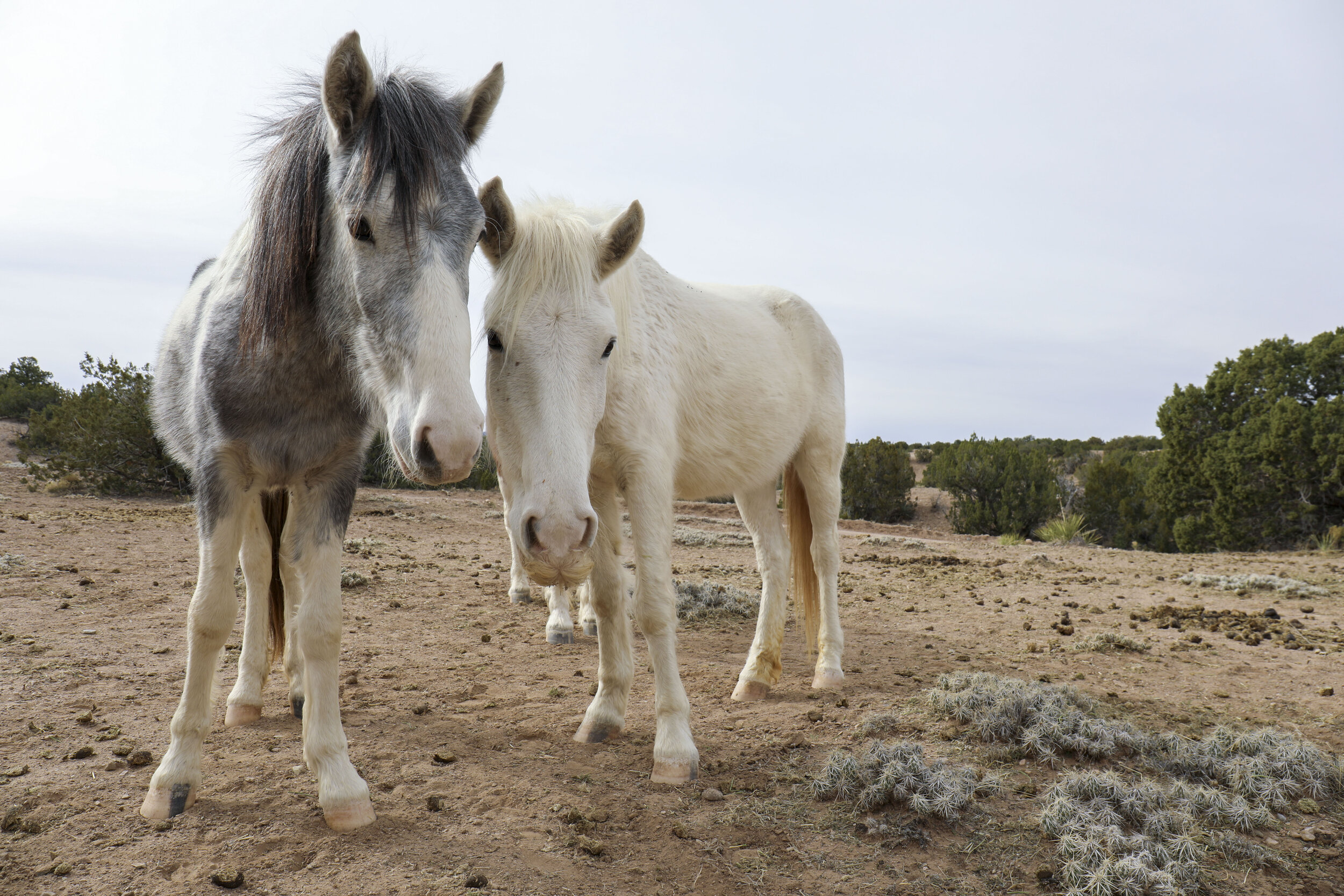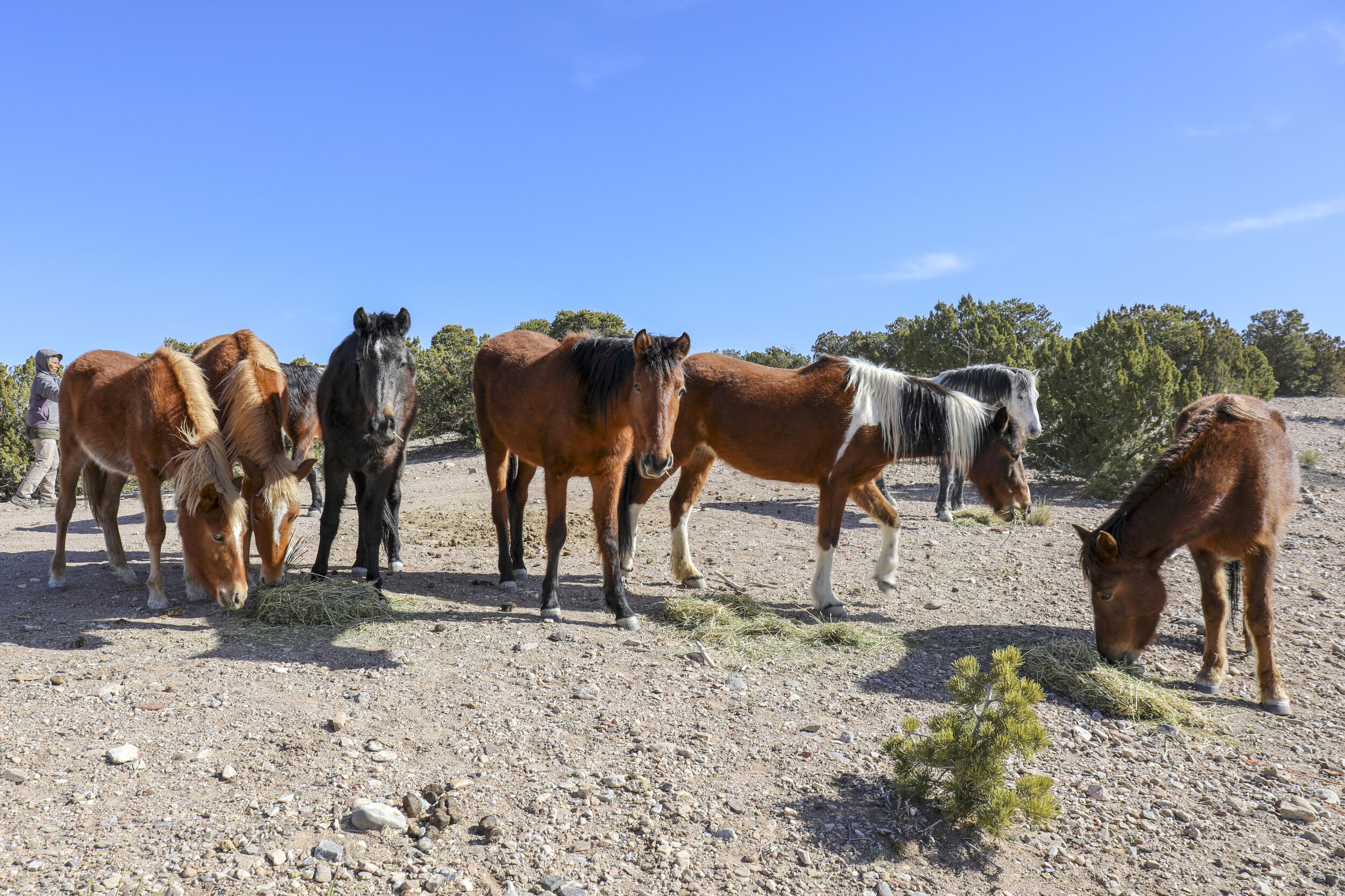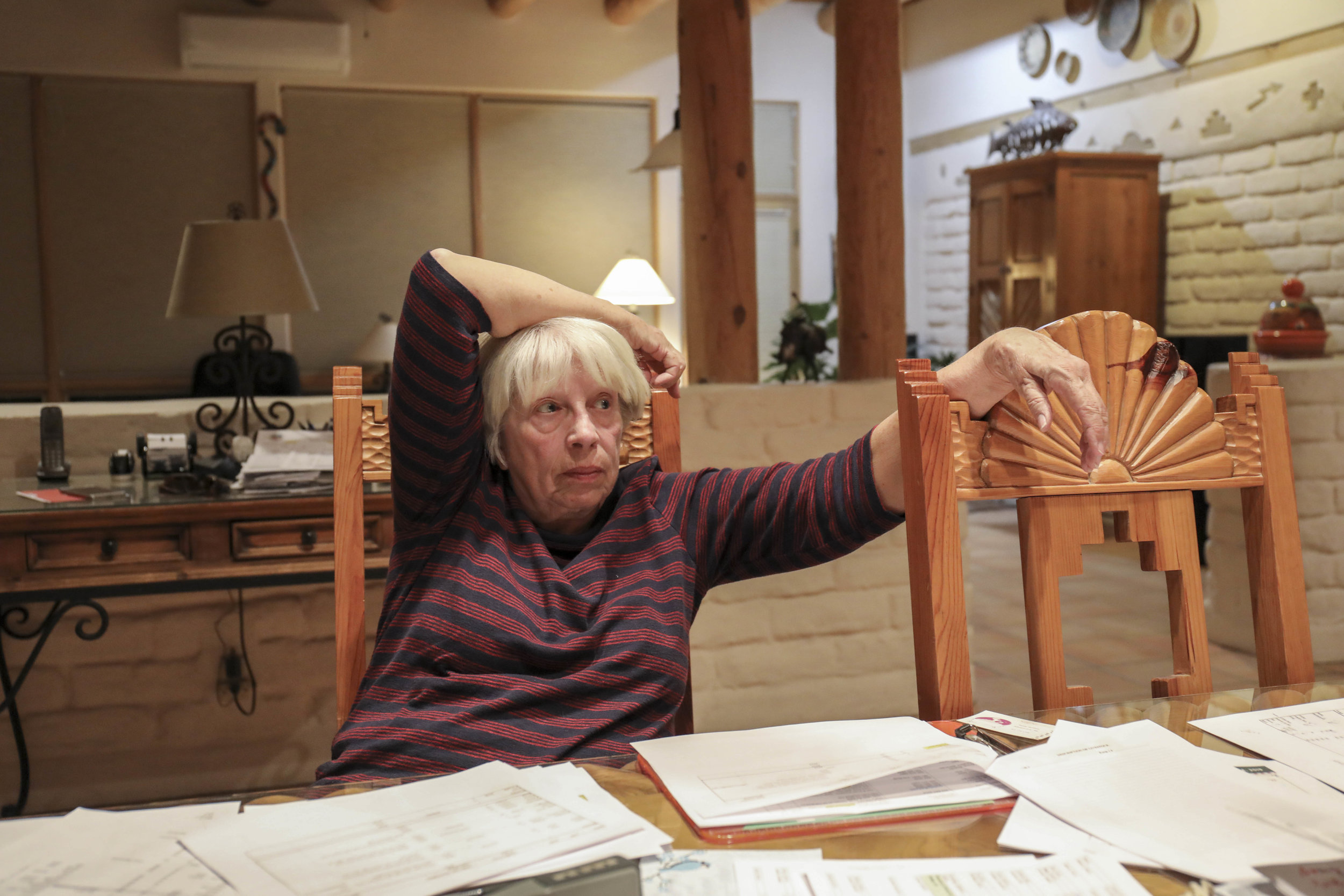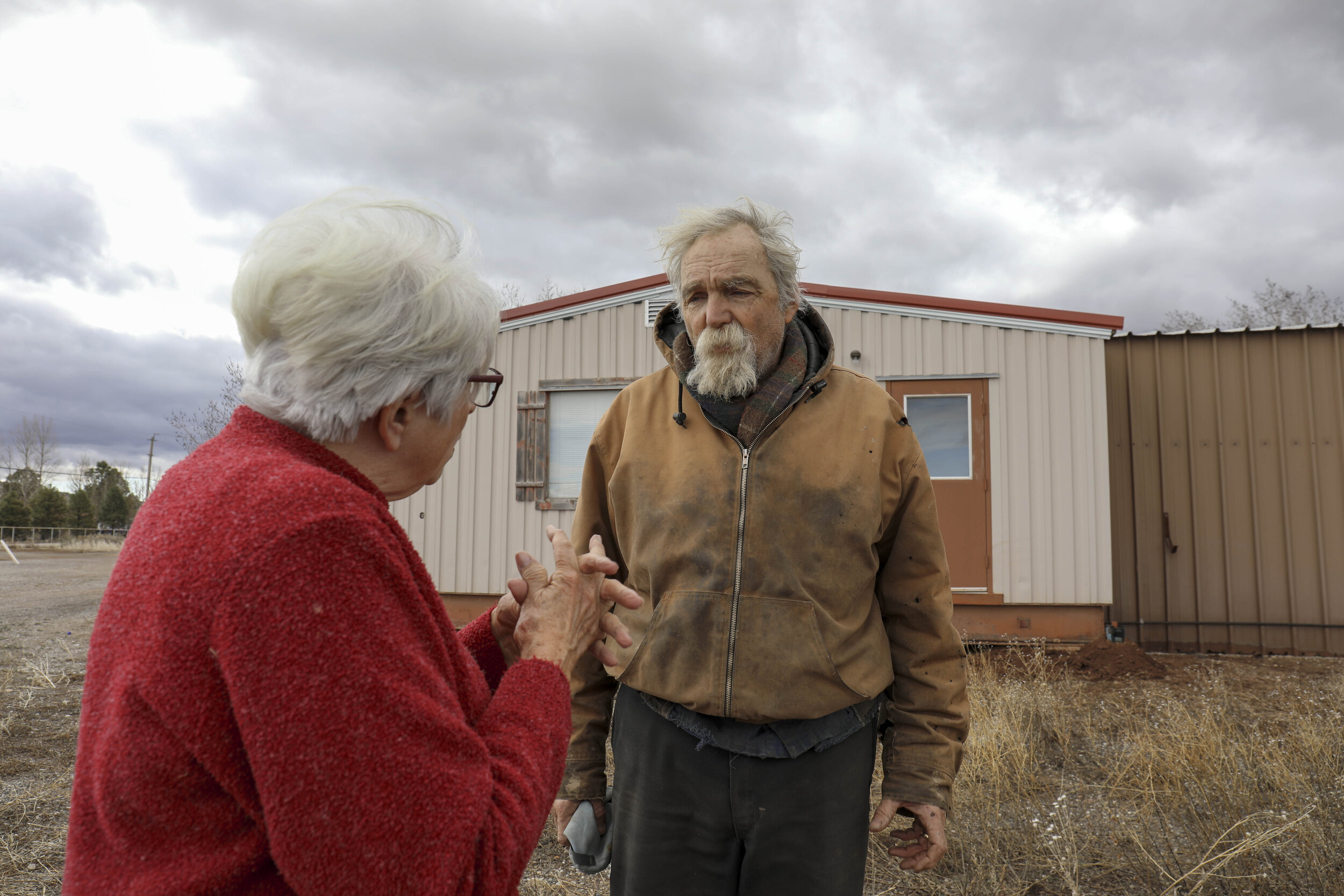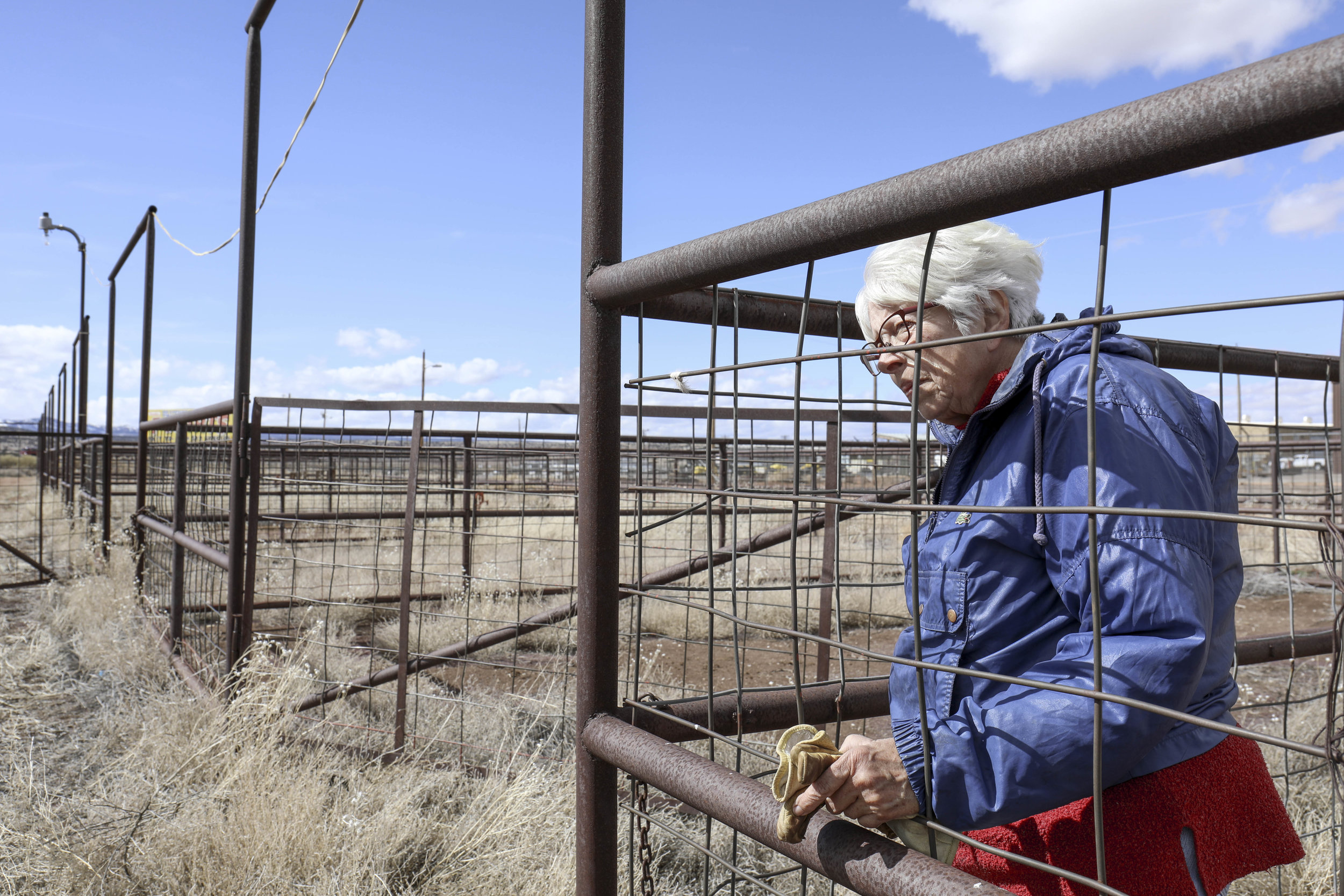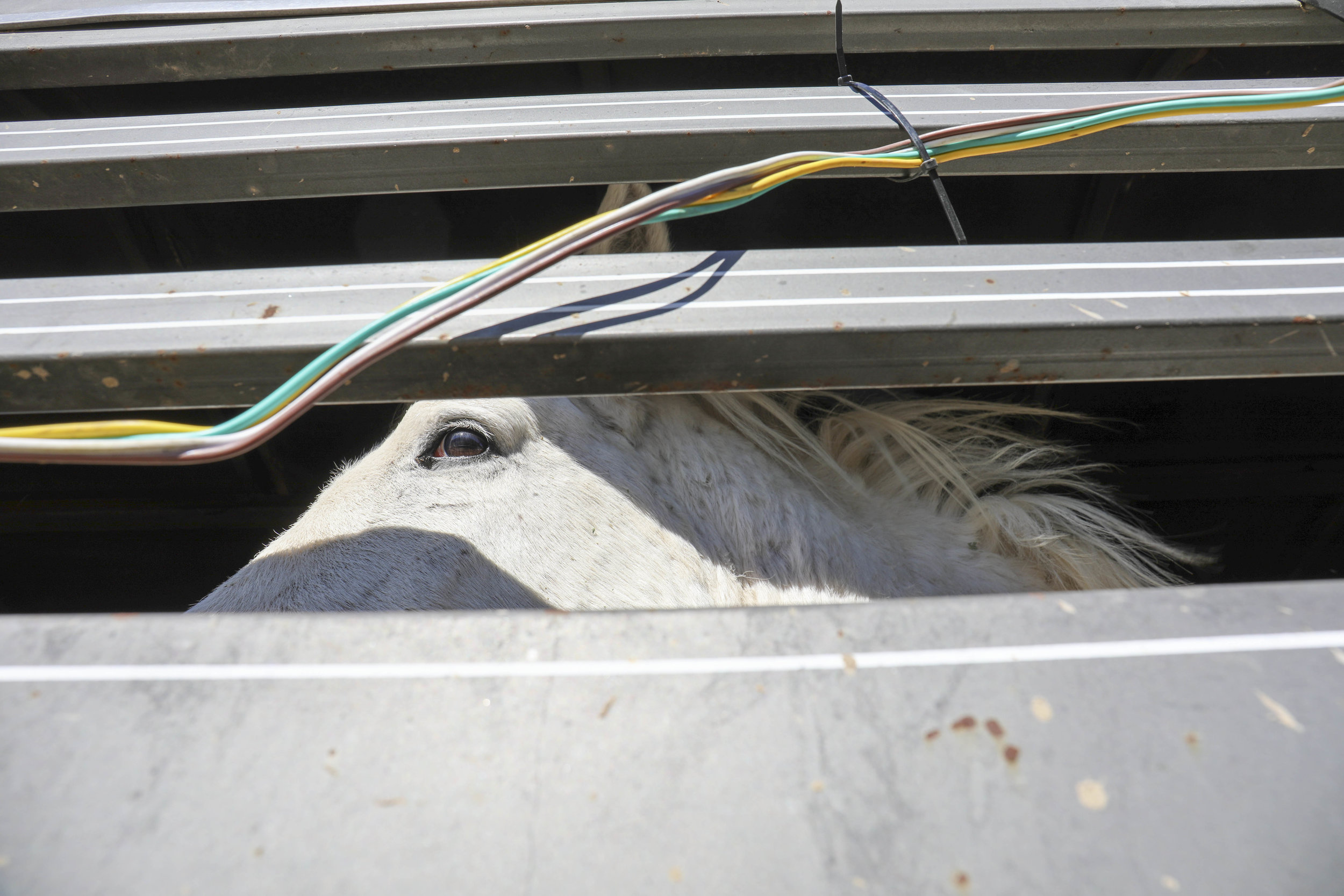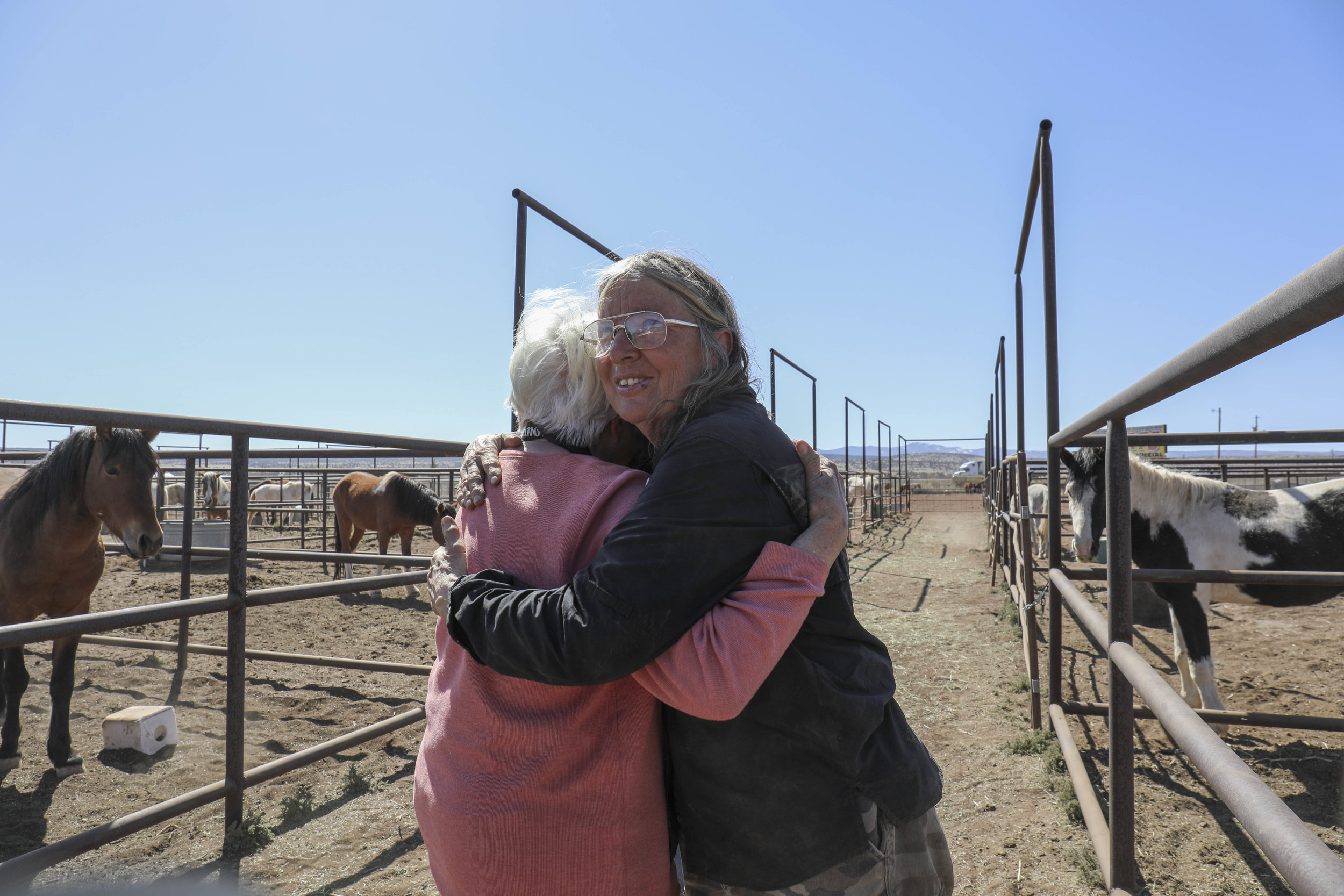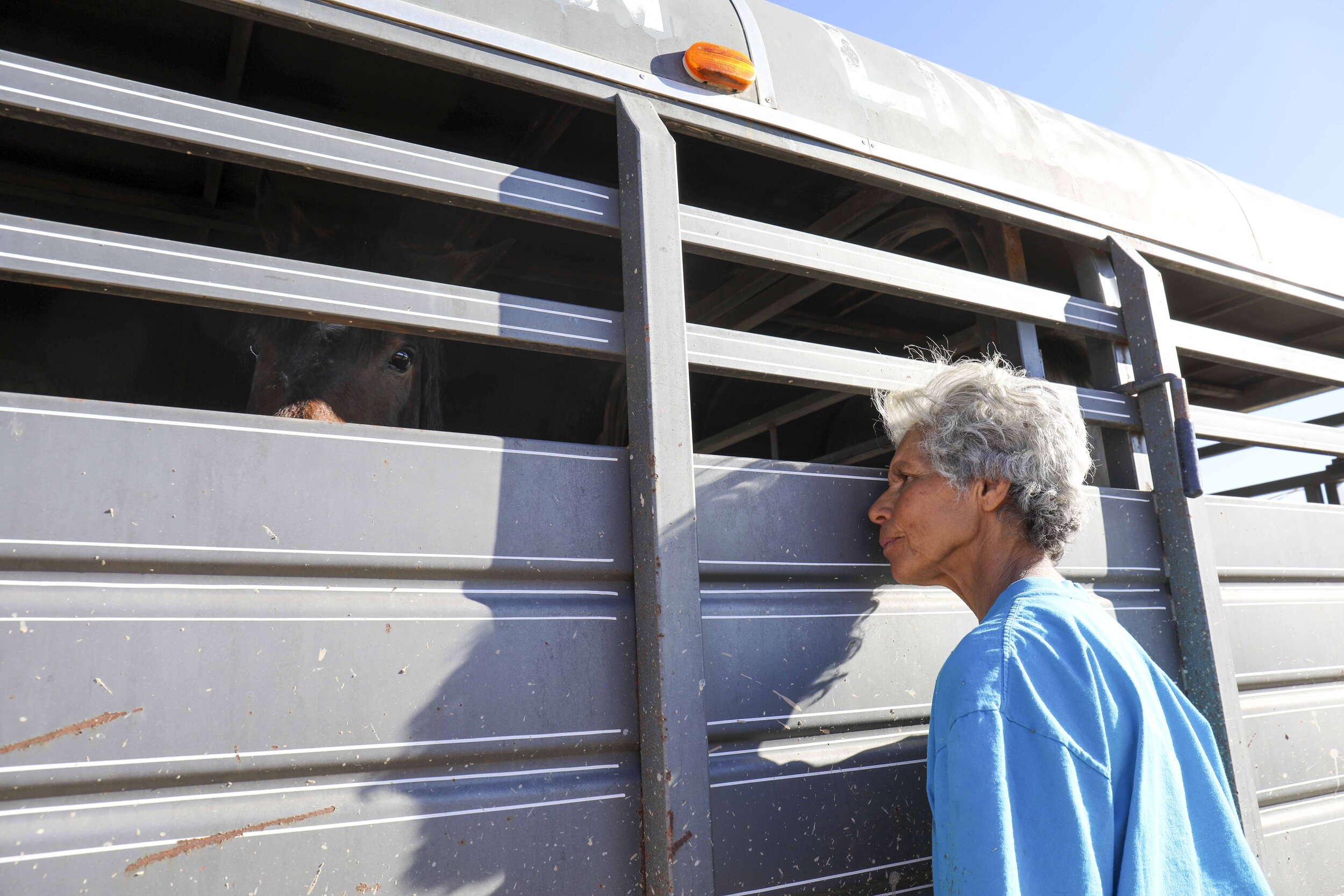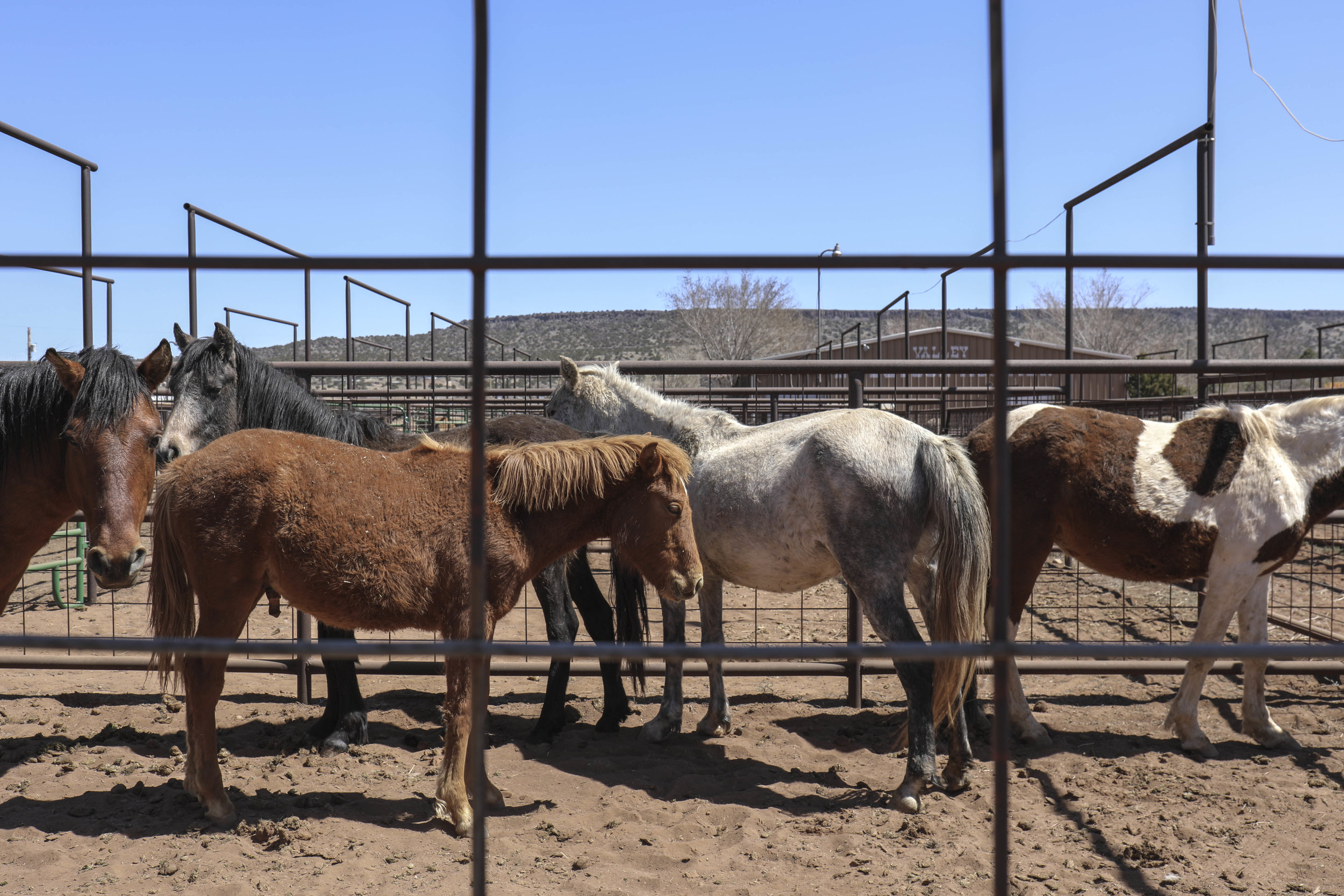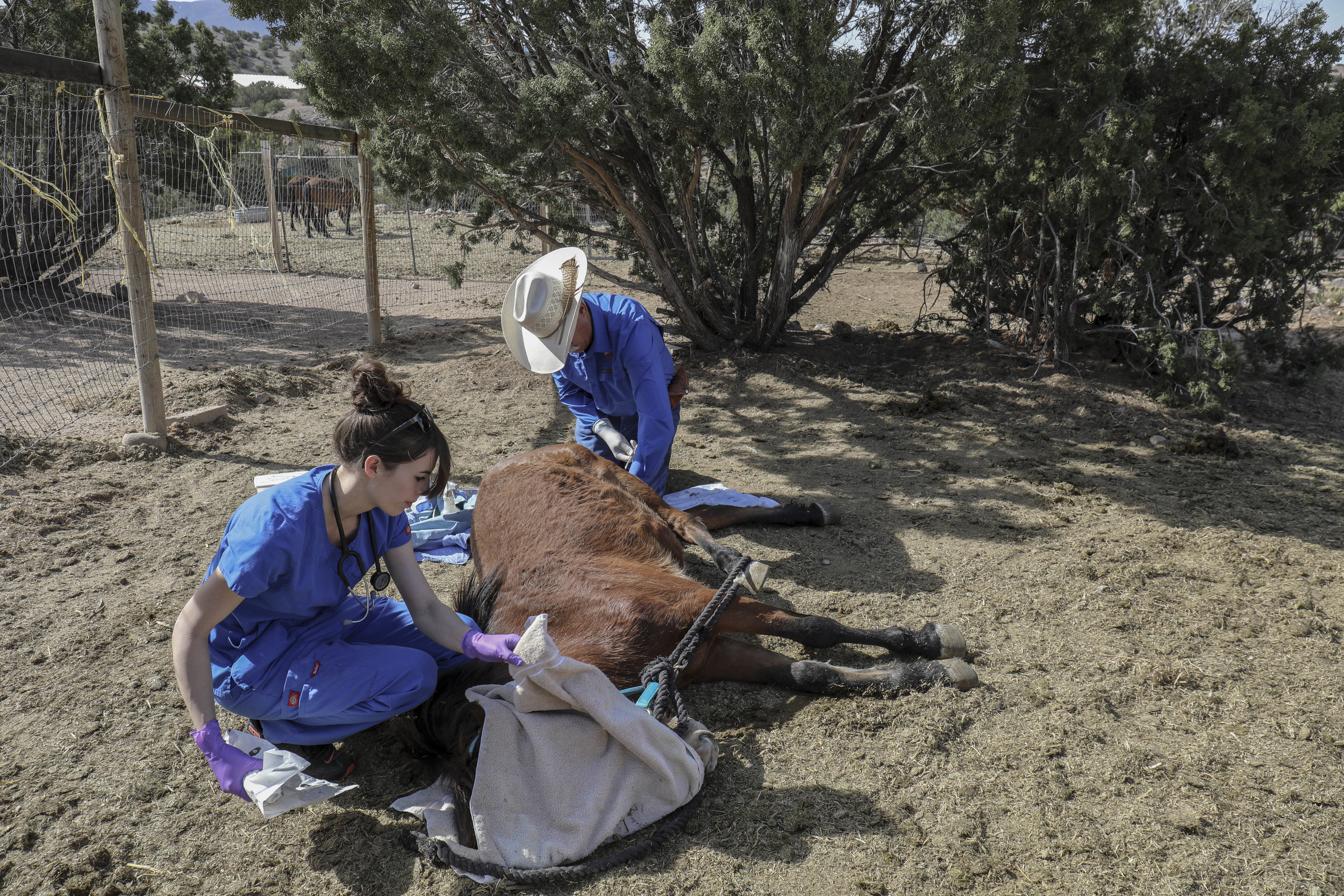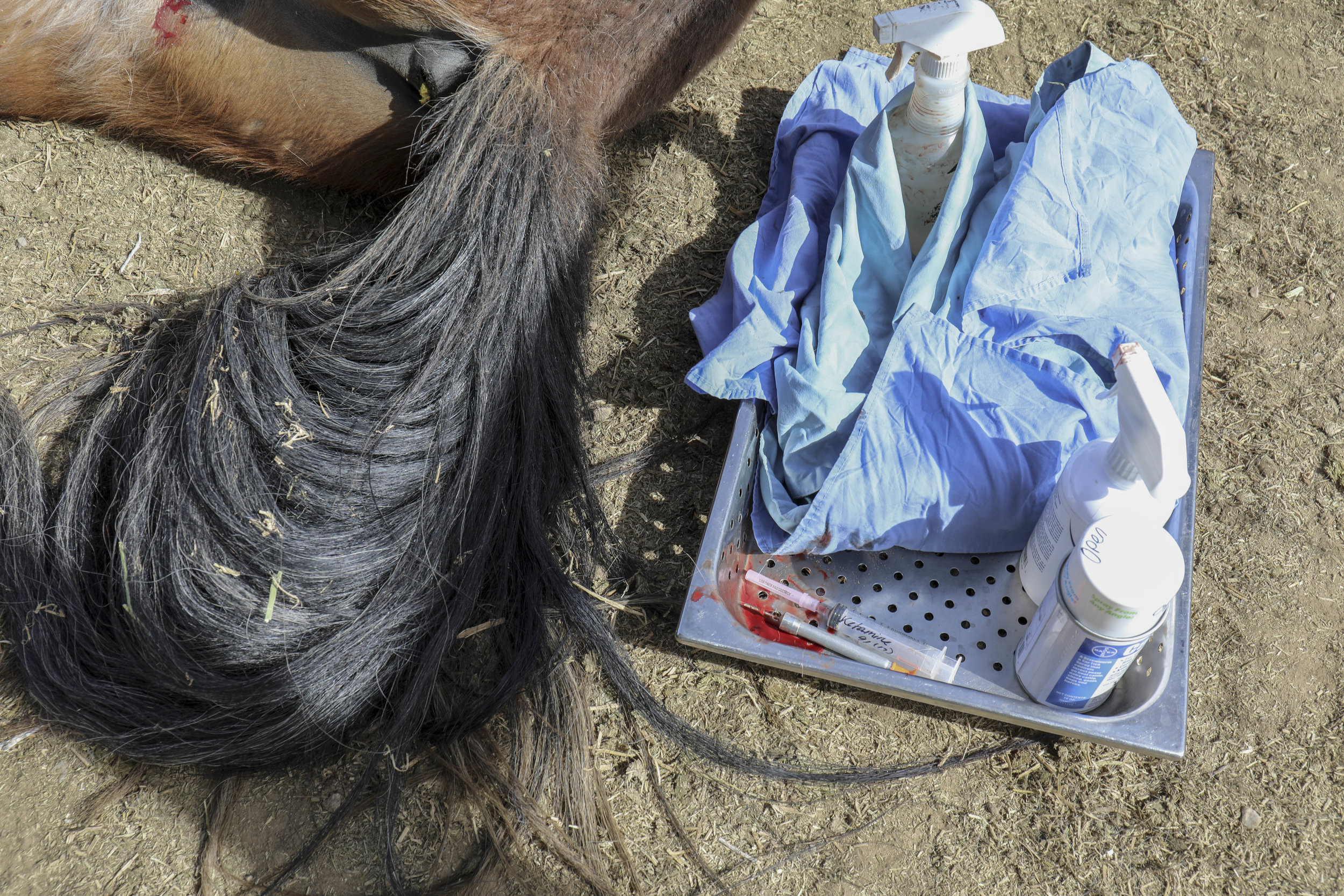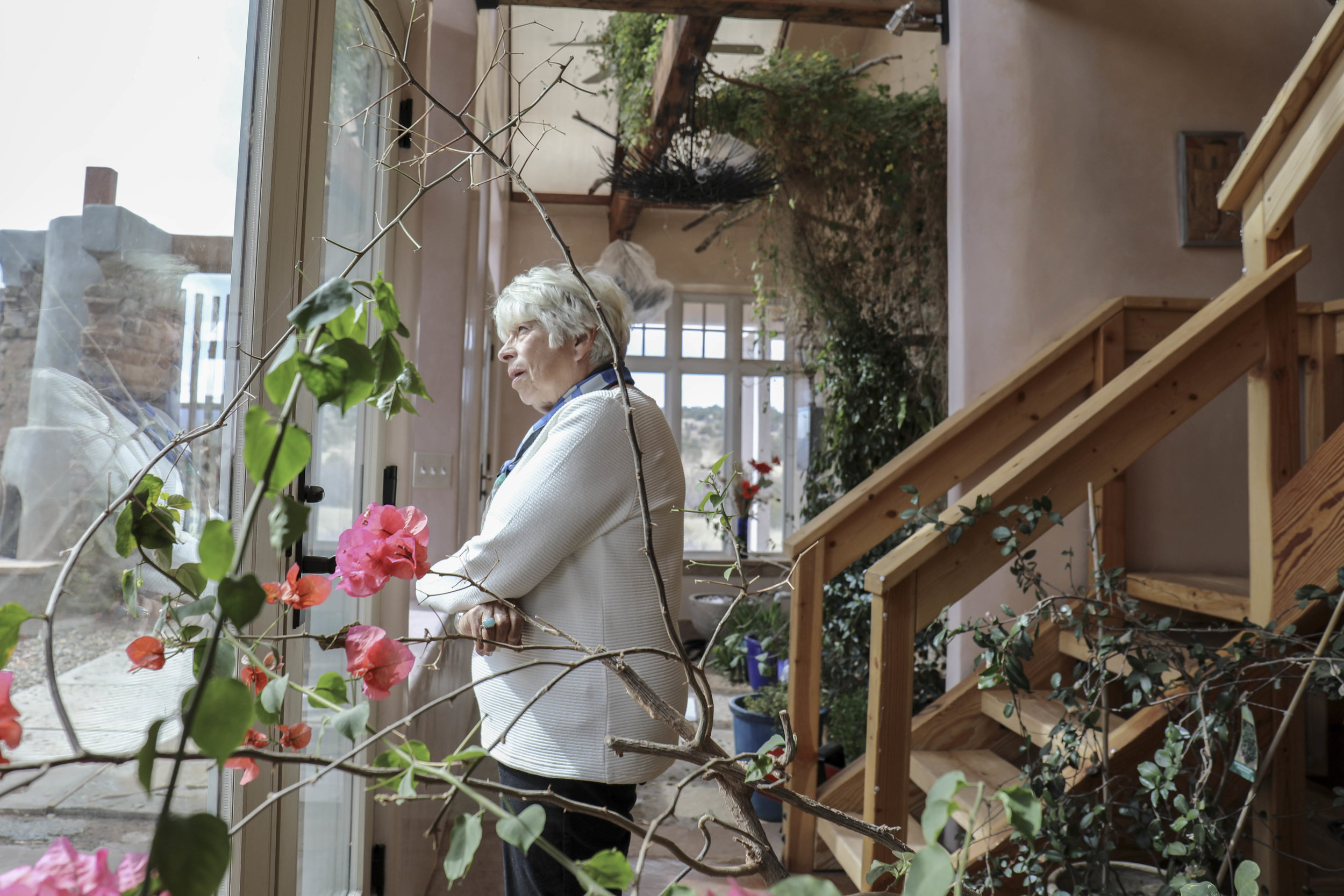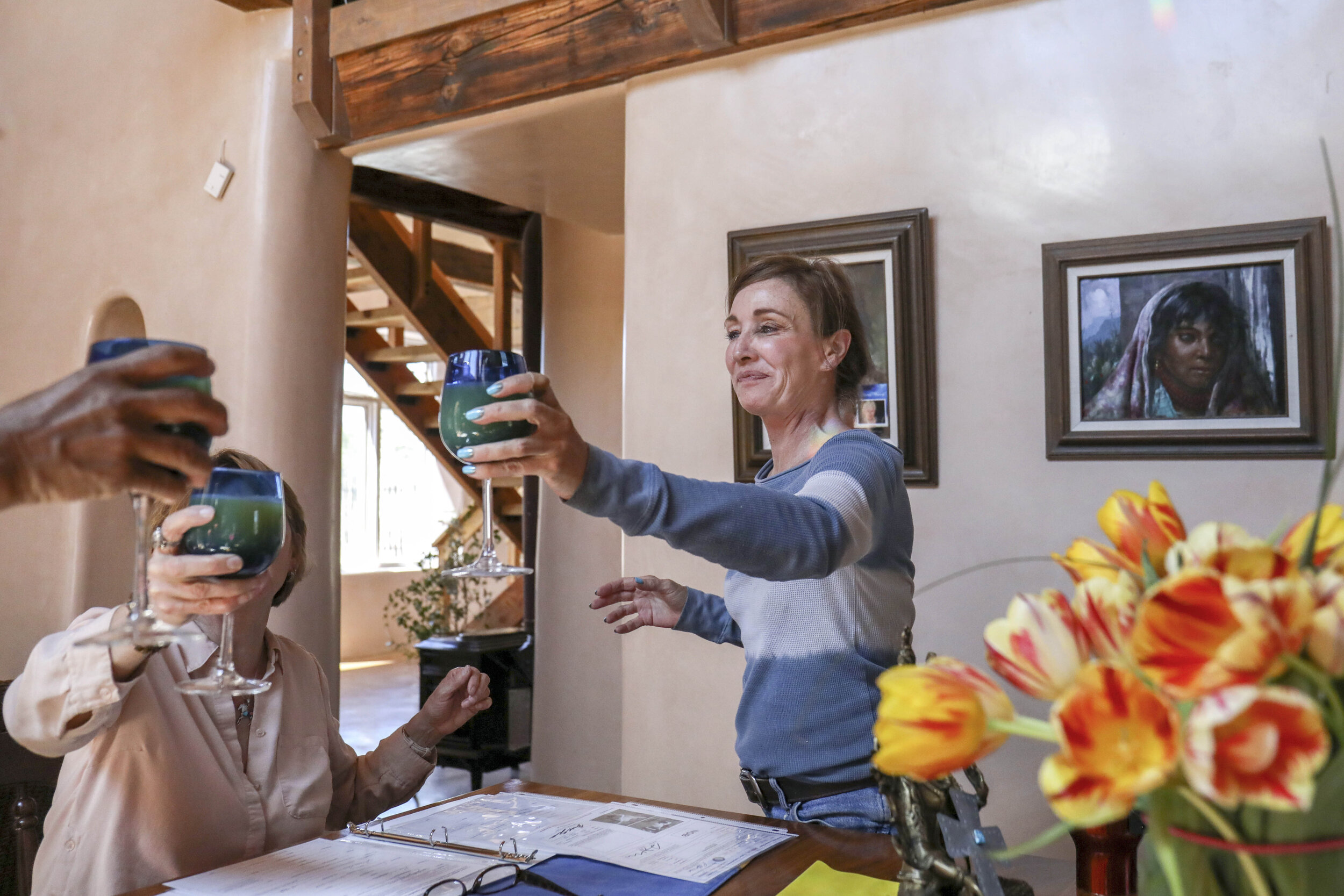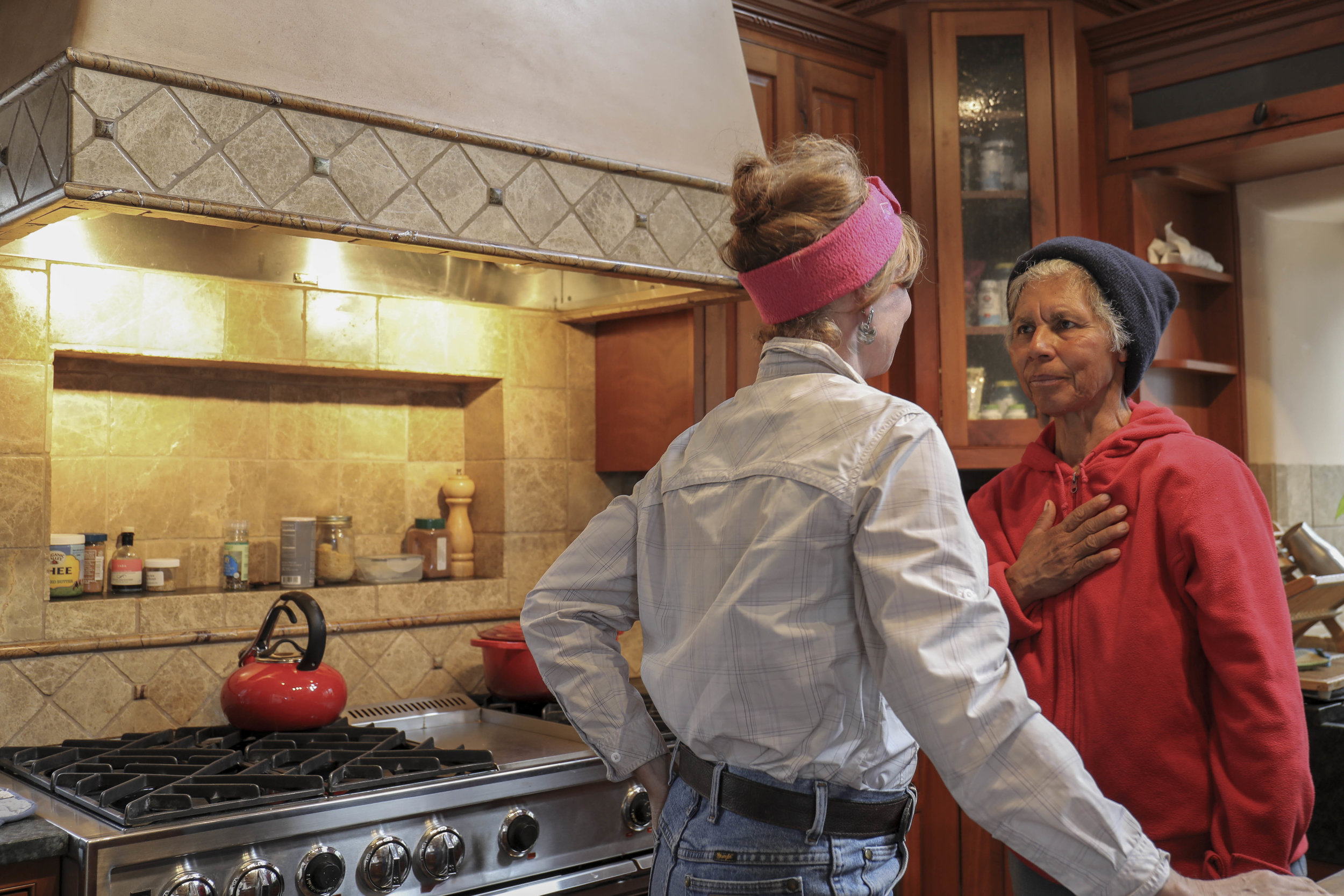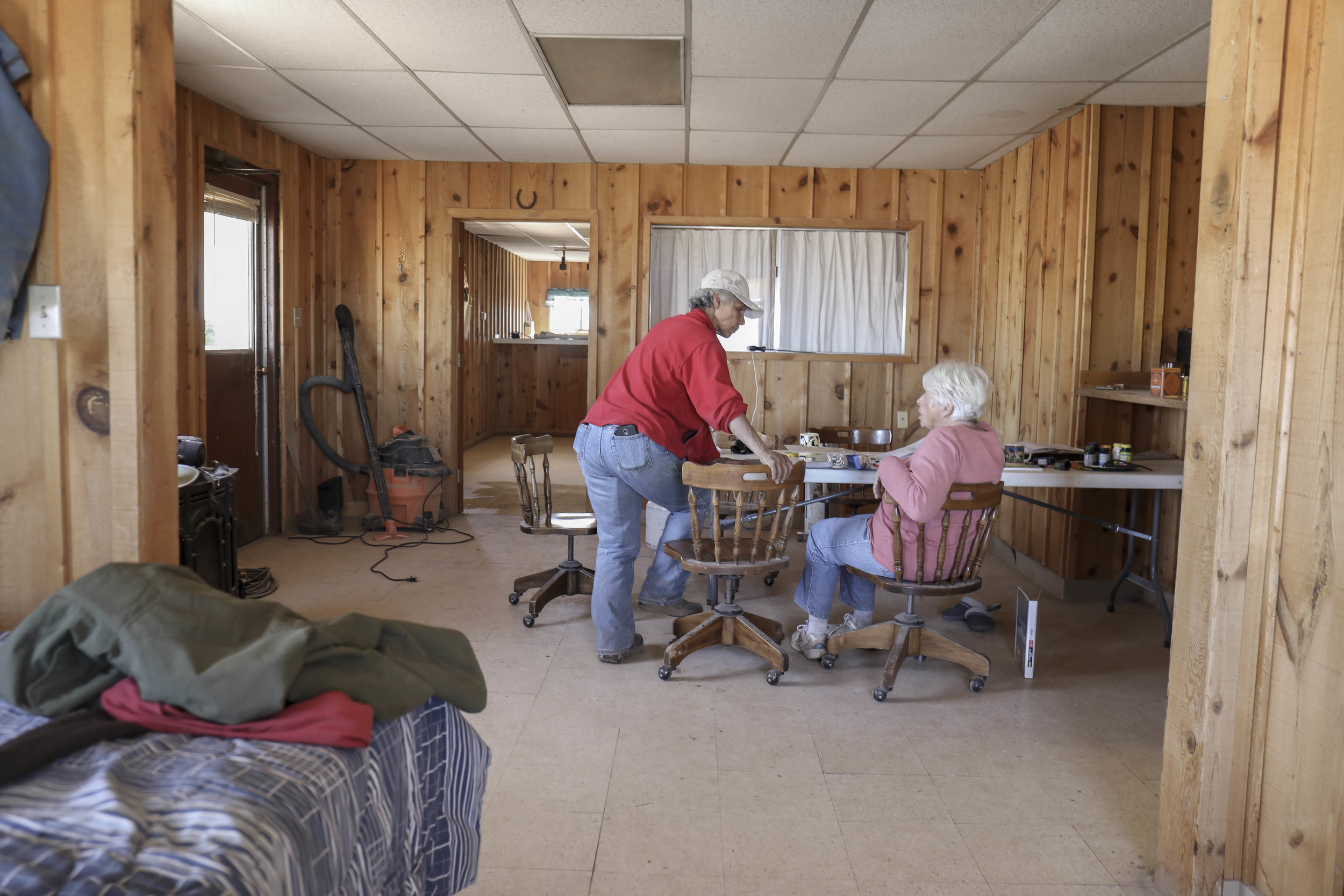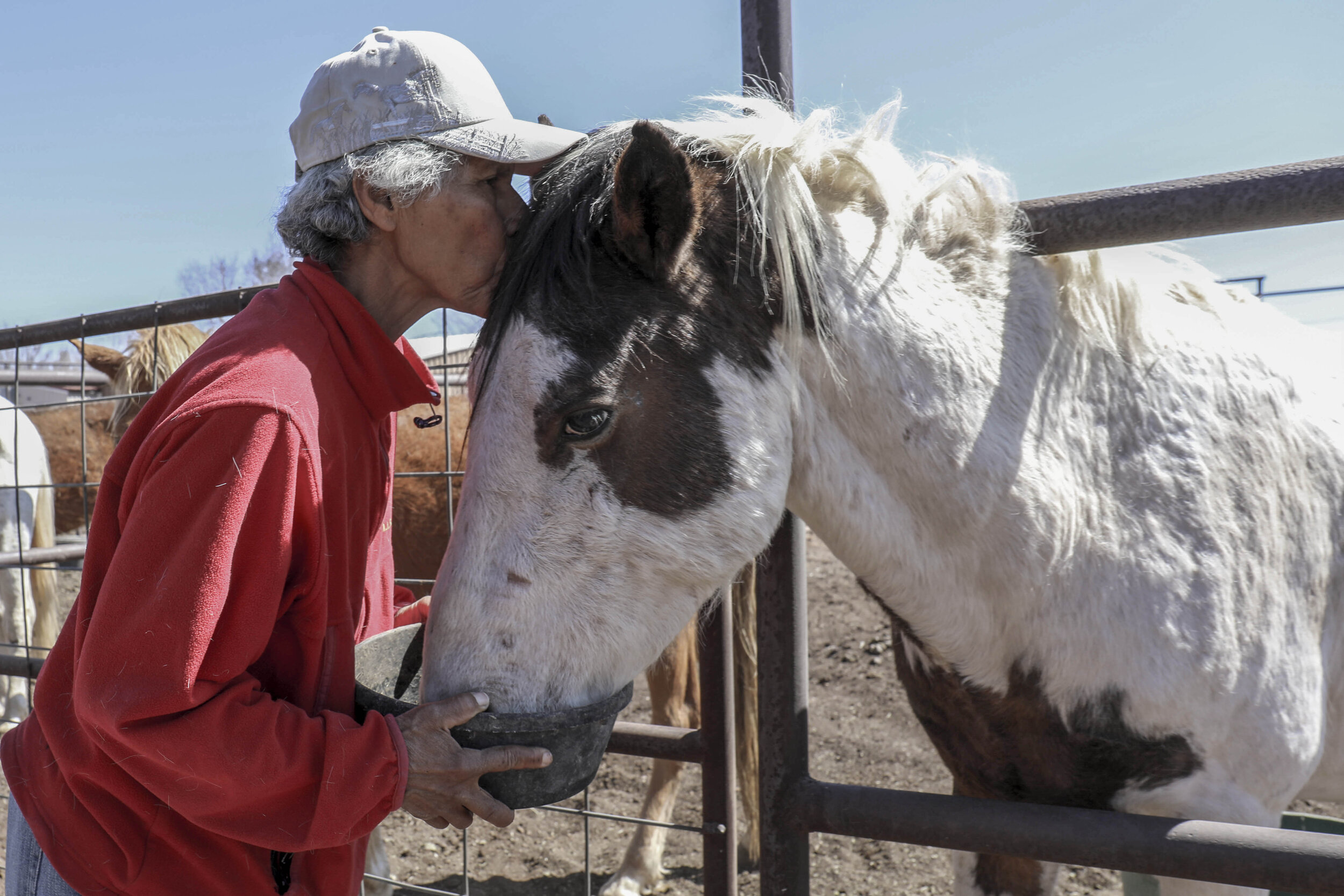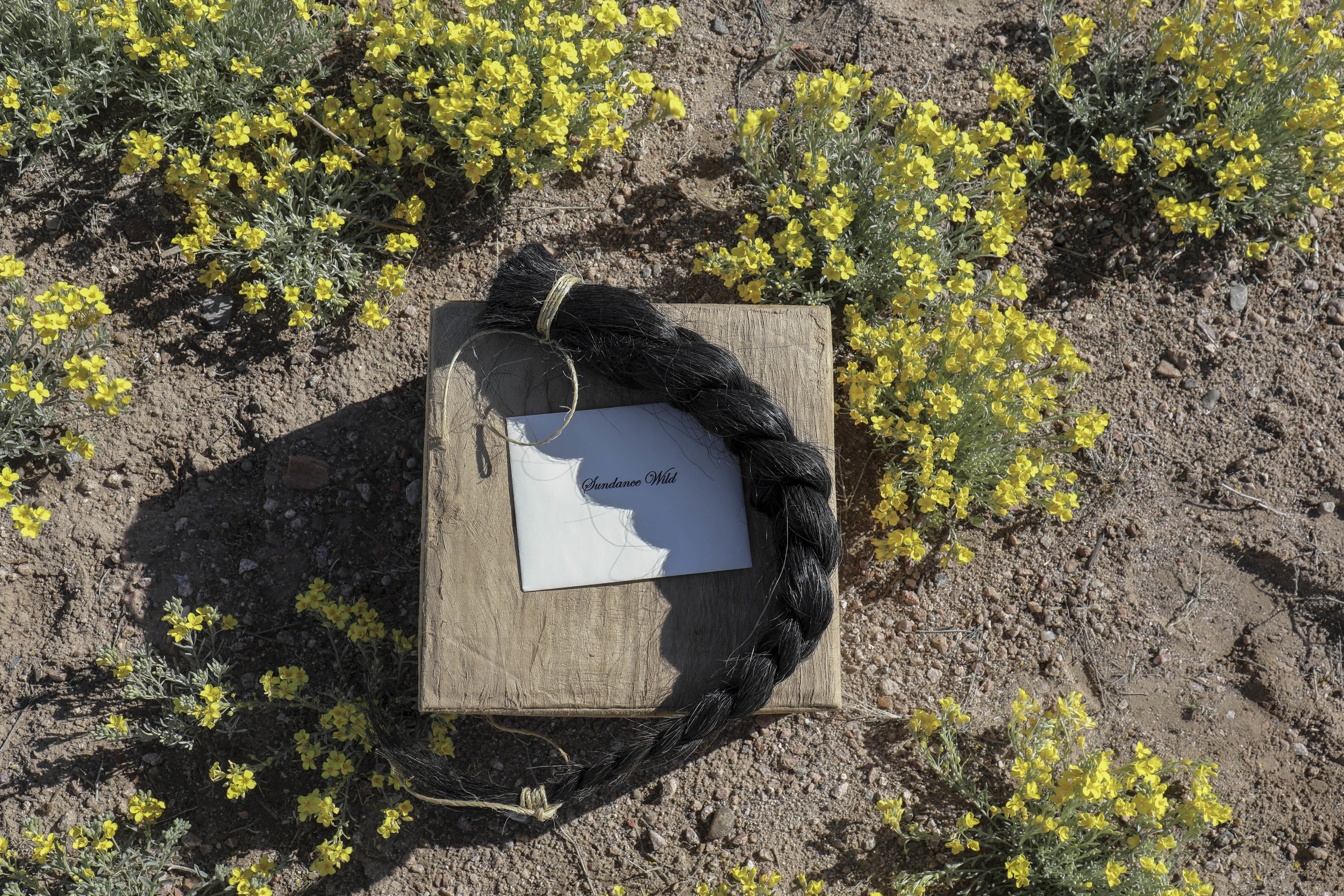Placitas Wild: Amid, Rancor, Advocates Scramble to Find Homes for Wild Horses
Written and Photographed by: Diana Cervantes for Bitterroot Magazine
Adelina Sosa, a longtime volunteer for the nonprofit organization Placitas Wild, pets one of the free-roaming horses she cared for on a daily basis outside of Placitas, New Mexico, in February. A month later, Placitas Wild had to find new homes for all the horses that were living on a preserve in San Felipe Pueblo.
In many areas of the rural West, wild horses present a fundamental controversy. They are bastions of frontier freedom to some, a nuisance to others. Proponents say they belong on the range, while opponents note the rangeland that holds them tends to be degraded. In New Mexico, nowhere is the debate around horses more heated than the tiny town of Placitas, 25 miles outside Albuquerque.
New Mexico’s wild horse population is relatively small — the Bureau of Land Management estimates about 240 live there, compared with more than 5,000 in Utah and a whopping 43,200 in Nevada — but many of those horses live in and around Placitas. There, the horses roam free both on federal and private land. For years, residents have fed and watered them, leading them into town and onto the highway, where numerous collisions have taken place. Nobody seems to know exactly what to do about them.
For Sandy Johnson, Adelina Sosa, and Karen Tyler of the nonprofit Placitas Wild, the horses are everything. In late 2014, Placitas Wild partnered with San Felipe Pueblo, a reservation outside of Placitas, to provide sanctuary for dozens of horses shortly before a routine roundup by the BLM could have removed them from the area.
Though the Placitas horses are often called “wild,” the federal government labels them otherwise. The Wild Free-Roaming Horses and Burros Act states that only horses and burros in locations where they were present during a survey after the law was passed, in 1971, receive that designation. All other horses that are free-roaming today, including those under Placitas Wild’s care, are considered feral.
According to BLM estimates, 88,000 horses and burros roam free on range its biologists say can support just 26,600. To decrease the population, BLM conducts roundups on its land and attempts to have the horses adopted out; today, more than 50,000 horses and burros are held by BLM in off-range holding pens throughout the West.
Since 2014, Johnson, Sosa, and Tyler have taken responsibility for the horses in San Felipe Pueblo, delivering bales of hay each day and water from a well — the 400-acre preserve does not have enough forage for the horses to survive on. But in December 2018, Johnson received a letter from Pueblo leadership saying it was ending the partnership, “to give the terrain time to recover.”
The Pueblo declined to comment for this story.
Placitas Wild had until March 18 to find homes for the horses. So, for three months this winter, Johnson, Sosa, and others worked constantly to move 87 horses around a region that’s unsure what to do with the species as a whole.
Sosa carries a bale of hay to the horses out in the reservation. To feed all the horses, Placitas Wild purchases 120-150 bales of hay a week to feed the horses. Due to a spike in hay prices in recent years Placitas Wild has spent $1,600 a week on hay which is funded through donations, fundraisers and at times out of pocket by the women. “A horse eats a 1/3 of a bale of hay and we have 70 plus horses, and we didn't always give them that much because they could forage a little bit,” Johnson said. Due to the lack of forage and water in the area horses run a risk of dying of dehydration and starvation.
Adelina Sosa looks fondly at one of the horses she has taken care of out on the San Felipe preserve. The horse is staring at the left-over grain in the truck bed, to the right a giant water transport jug can be seen which is used by Sosa to deliver water to the horses.
Adelina Sosa, seen above carrying a bale of hay to the horses on the San Felipe preserve in late February, has been helping with the free-roaming horses since she moved to Placitas 19 years ago. The 69-year-old has tended to their wounds, nursed starving horses, and helped deliver a foal that was stuck in the birth canal.
“Once they accept you as part of their herds, they kind of greet you even better than people [do]. They are just loving, caring animals like us, and they suffer like us,” she said.
Horses graze on hay brought by Placitas Wild to the preserve on Feb. 24, 2019.
Adelina Sosa, pets one of the free-roaming horses she cared for on a daily basis outside of Placitas, New Mexico, in February. A month later, Placitas Wild had to find new homes for all the horses that were living on a preserve in San Felipe Pueblo.
Gorgeous basks in sunlight at the reservation days before she is picked up by her adopter. Gorgeous now named Sierra, spends her days at Jackie Fleming’s ranch in Northern New Mexico with some of her family who were also adopted. Fleming is setting aside 100 acres for the Placitas Wild herd so they can live their lives free roaming.
Varied terrain on the reservation where Placitas Wild horses roamed freely for four years. Many of the horses from Placitas Wild were brought in from Placitas and the neighboring BLM land.
This band wandered up to the preserve in recent years after they noticed food and water in the area, due to lack of space and funds this band would sadly be left behind at what used to be the preserve. Cofounder Sandy Johnson was distraught at leaving them behind. “It breaks my heart, but we can’t save them all,” Johnson said, holding back tears.
A group of curious free roaming horses approach me while at the San Felipe preserve on March 7, 2019.
A band of horses grazes on hay delivered to the San Felipe preserve by Adelina Sosa on Feb. 27, 2019.
Co-founder of Placitas Wild Sandy Johnson, 71, looks at co-founders Adelina Sosa and Karen Taylor. The women met at Johnson’s home on the evening of Feb. 25, to discuss which horses would go where.
Johnson speaks with John Irick co-founder of Mustang Camp as they prepare to clean stalls and clear weeds at the camp in Milan, in preparation for the horses arrival in a few weeks.
Sandy Johnson, 71, looked out at the pens at Mustang Camp in Milan, New Mexico, on March 3. Mustang Camp agreed to train and assist in finding adoptive homes for 54 of the horses from Placitas Wild.
Johnson began caring for the free-roaming horses of Placitas shortly after she and her husband moved there from Seattle in 2002. During a bad drought in 2004, she, Sosa, and Tyler began feeding two horses roaming Placitas and the surrounding BLM land. By 2014, when Placitas Wild opened the preserve on the San Felipe Pueblo, they were caring for more than 70 horses.
Johnson and Sosa do the bulk of the Placitas Wild work, and it comes with sacrifices. “A lot of times there are things that come up with the horses that require immediate attention, and you have to drop whatever you had planned to do,” Johnson said. “Then the hours daily that you spend taking care of them — lots of hours — I don’t regret it, but … we made a commitment to keep them safe and well.”
Placitas Wild spent around $1,600 per week on hay to feed all the horses. The money came from donations and, at times, out of the women’s own pockets.
“I can’t tell you how much I lay awake at night thinking, How the hell am I going to pay $1,600 a week for hay? That doesn’t happen easy,” Johnson said. “We are getting older, too, and we have to realize that we can’t do this [forever].”
One of the Placitas Wild horses, Cheyenne, (above) waited to be transported to Mustang Camp on March 18. There, he will be gentled and trained for adoption. Although Johnson and Sosa would have preferred for the horses to remain free-roaming, domestication seemed like one of the few solutions at their disposal.
“If it means they are going to be all right, then I can deal with that,” Sosa said.
Trained horses are much likelier to be adopted. For this reason, among others, the BLM began in March offering $1,000 to those who adopted untrained horses. It even launched a website last year to facilitate online adoptions.
“The BLM is taking action where it can to increase the number of animals adopted or sold to good homes,” said Jason Lutterman, public affairs specialist with the bureau’s National Wild Horse and Burro Program. “We’re also continuing to work with our partners to train more wild horses and burros to increase their chances of finding a good home, and the BLM continues to supply trained horses and burros to other public agencies, such as for the U.S. Border Patrol and local mounted law enforcement programs.”
Back in San Felipe, horses that have wandered onto the preserve since the others were relocated have been left behind. Their fate is unknown.
“It breaks my heart, but we can’t save them all,” Johnson said, holding back tears.
When the horses arrived at Mustang Camp, Johnson thanked Patricia Barlow-Irick, right, its founder. Mustang Camp typically receives horses from BLM holding pens, but the federal government shutdown in December and January slowed their supply of BLM mustangs, creating an opening for the Placitas Wild horses.
“I felt bad for the people involved,” Barlow-Irick said. “Sandy Johnson has put a lot into doing this and trying to make it work. She basically was just being crushed by what was happening. I mean, that’s just a huge, devastating turn of events for her.”
Sosa, seen here saying goodbye to a horse, Happy Boy, as he waited to be transported to Mustang Camp, appreciates the connection she built with the horses. “I like animals. I observe them, I try to understand them. I read them and respect their boundaries, their space — they also do that with us,” she said. “You just have to pay attention to the animal’s behavior and know when to get in their space and when not to.”
Barlow-Irick, who holds a Ph.D. in biology, created a 26-step training program to domesticate wild horses; the first is taking food from a person’s hand. Placitas Wild will fund the horses’ training and care, at $600 per horse, until they are adopted. Horses that aren’t adopted will remain at Mustang Camp until Placitas Wild can find another placement.
Los Lunas Animal Clinic veterinarian Donny McDougall gelds one of the Placitas Wild free roaming horses before they go off to their forever homes. Gelding of stallions is crucial to their overall health and population control.
Sterilization products and medicine lay next to a what was a wild stallion who is sedated.
On April 7, Kimberly deCastro, center, toasted the Placitas Wild crew after finalizing the adoption of 10 horses, which will range on 160 acres she owns southeast of Santa Fe.
Johnson and Sosa hoped to send all their horses to homes where they could continue to roam free. After deCastro decided to take some of the horses, the women of Placitas Wild decided to pick the ones that they felt closest with for this relocation. “The minute we knew Kim would take [some] we said, ‘Who is most deserving?’” Johnson said.
Placitas Wild was able to send a few other horses to private owners like deCastro, but the group is still caring for more than 20 horses that are being kept on private land near Placitas. Recently, a donor funded the purchase of 40 acres for the nonprofit. There’s still a need for its work — about 75 horses still roam freely around the area, Johnson said.
DeCastro already feels a connection to the horses, including Milagros, Tiny, Blossom, and Rosita, pictured above. Free-roaming horses stir passion, strife, and controversy just for their existence. DeCastro epitomizes the unusual place these horses occupy in the Western psyche. Their charm comes from the lack of corrals, restraints, domestication. But the horses Placitas Wild took care of did, and still do, live within fences.
“When they first came home, I cried — it was a powerful experience for me watching them unload and run to explore what would be their home for the rest of all of our lives,” deCastro said. “I go to see them every day, and each day is different. They show me new parts of their personality with each meeting, and I share a new part of me with them.”
Sosa, left, and Johnson return to Mustang Camp to sort out paper work and check in on the horses.
Sosa kisses one of the horses she cared for out in the wild for many years, for Sosa it was difficult seeing once free-roaming horses behind pens. Here, she is giving them a treat.
Sundance ashes and mane in an urn surrounded by wild flowers at Johnson’s home. Sundance was the patriarch and fathered many of the horses that Sosa and Johnson went on to care for, Sundance passed away from colic.
